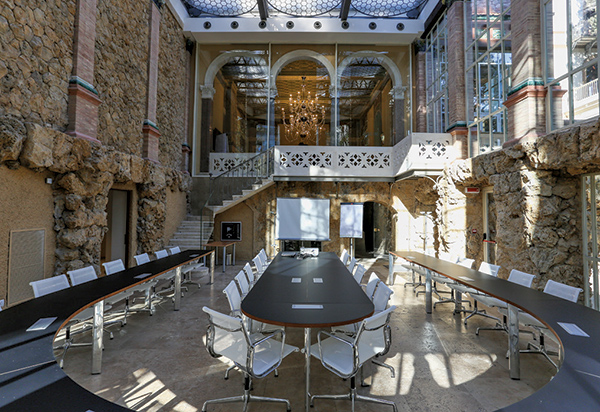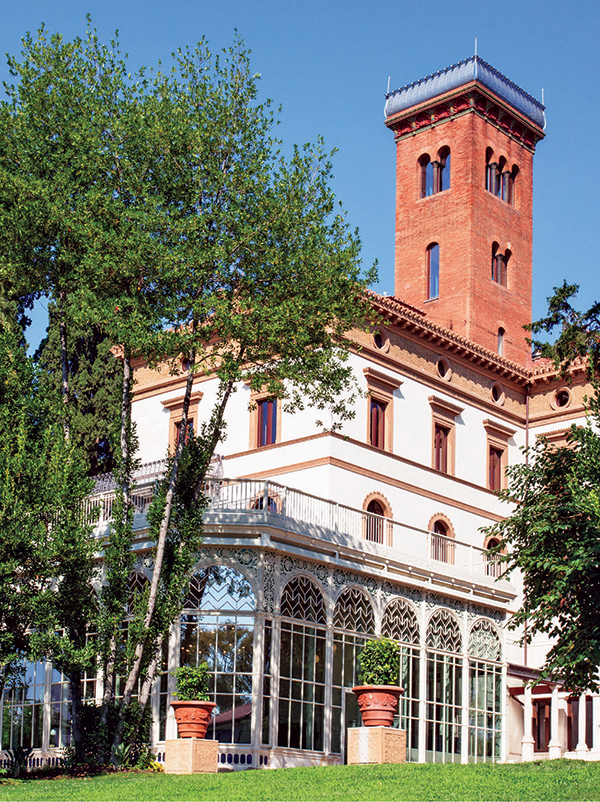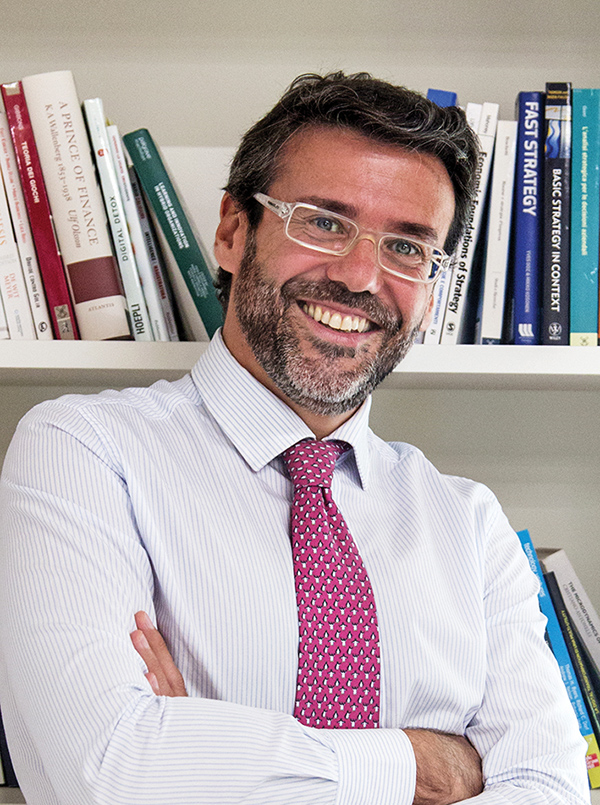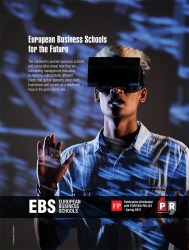Frameworks for Executive Development on a Global Scale
While the size of their physical geographical footprint might vary, Europe’s premier executive educators all have substantial and influential international networks
One way the best business and executive education institutions can differ from each other is in their attitude to internationalization. Hult Ashridge Executive Education, for example, defines itself as “British, global and, even with Brexit, very European,” says Dean Dina Dommett. Based near London, Hult Ashridge is the result of a 2015 alliance between Ashridge Business School and Hult International Business School.
“We have campuses in Ashridge, Boston, San Francisco, London, Dubai, Shanghai and New York, and a uniquely international student, faculty and staff community. It’s deliberate that we should be global, not only in terms of campus, but in how we design our degrees, open and custom programs,” she explains.
Hult Ashridge does well in rankings because it offers customized executive education that is personalized and facilitative, Dommett states: “We tackle problems together with our clients and all our faculty have real-world experience.” Prior to joining Hult Ashridge, Dommett worked at the renowned Saïd Business School at the University of Oxford. Her boss there, Dean Peter Tufano, agrees that a grounding in practice is key to educating executives: “They have little tolerance for theory that is not applicable.”
“If all you do is enroll students from around the world with no regard for their different perspectives, that’s a failing.”
During the COVID crisis, Hult Ashridge’s emphasis on human resources, capability, support and development has never been more relevant. “Fortunately, we have strengths in virtual delivery and provide limitless learning for global students and participants, she says. Challenges for global educators are issues relating to equality, diversity, inclusion and belonging, she cautions: “If all you do is enrol students from around the world with no regard for their different perspectives, that’s a failing.”
Audencia’s largest campus is in Nantes, France, but it’s another school with a physical international presence, with three campuses in China and one soon to open in São Paolo. “We collaborate with local institutions abroad because we consider that a more effective way to understand the local ecosystem. We are proceeding the same way in Africa, where we have launched Executive MBAs in Senegal and Morocco,” reveals Dean Christophe Germain, adding that innovative executive education is a crucial part of Audencia’s portfolio.
Internationalization in education is far from being a modern construct, according to Dean and CEO Massimo Bergami of Bologna Business School (BBS), part of the world’s oldest university: the Alma Mater Studiorum or University of Bologna. “It was created in 1088 by students from all over Europe and the history of the university is very connected to the concept of a boundaryless international community of scholars. This is our heritage as BBS: interdisciplinarity, autonomy, an international mindset, strong integration with the world of practice.”
Bergami believes that a unique strength of the school is its community that includes numerous industrial partners and a large network of international alumni, many of whom have taken advantage of BBS’s executive programs. He highlights a Global MBA, which focuses on “Italian leading industries rather than functions, in order to be as close as possible to the world of practice.”
Another Italian institution, Luiss Business School, also combines an international viewpoint with strong local links. “We call our approach ‘glocalization’,” says Dean Paolo Boccardelli, adding that it’s a concept related to the fact that globalization is changing and regionalism is growing. “We think that leadership must take into account a global perspective and be able to balance, understand and adapt to the real local needs of communities. We have operations in Rome, Milan and Belluno, as well as Amsterdam in the Netherlands. We want to drive our investments in such a way that we are close to those local communities with two pivotal words: global perspective and creative leadership.”
ESCP Business School maintains that, as a world without geographical or cultural borders will almost certainly never exist, leaders need to be trained to be able to bridge the borders they might face. As a result, the institution ranked seventh worldwide for executive education by the Financial Times has fostered a multicultural, interdisciplinary and open approach that embraces pluralism at its campuses in Spain, Italy, Poland, Germany, England and France.
“We also work with many remarkable people around Europe and on other continents. In Asia, we work with important institutions, including the China European and International Business School. In North America, we are very connected with Cornell University, Massachusetts Institute of Technology and the University of Texas at Austin. We want to work with people that share common values with us and where students can experience fulfilling exchanges,” Dean and Executive President Frank Bournois clarifies.
Summing up ESCP’s internationalization model, Bournois says: “In Europe, we are at home and we run our own campuses. On other continents, we have the best partnerships.”
Adaptive, Boundless and Lifelong Learning Strategy
Close corporate partnerships help to create better leaders for a better world

Founded in Rome in 1966 with the task of educating leaders for Italy and for serving a larger community, Luiss Business School takes an authentic and personal approach to creating “better leaders for a better world” that is grounded on an adaptive, boundless and lifelong learning strategy.
Today, the school’s offering goes far beyond business: it generates processes of transformation, encouraging an attitude of change so that its students become leaders who help the development of the business community in a sustainable way.
“We have always worked closely with our stakeholders, as a member of a community: not just in the academic environment but also the corporate sector, steering in an effective way to educate leaders for their needs and society,” says Dean Paolo Boccardelli.
Luiss Business School’s mission is to be very close to its external partners, mainly corporations, in order to help them to grow, transform and catch up with the challenges of our time, such as exponential changes in technology.

“We are looking at the digital transformation as a key feature of change in our business and society as a whole. We are already, in terms of artificial intelligence, within a transforming business model. Luiss Business School’s modus operandi has constantly progressed over the years to meet the emergence of new goals in our market.
“In this extremely complicated and fast-changing scenario, the business schools have the great responsibility to educate the ruling class of a challenging future. Our students should be able to bring to the community not only their technical skills and disciplinary competences, but also their sheer will to become an active player in innovating within society,” Boccardelli states.
Driven by data
“One of the new characteristics of the school’s business model is the adoption of a data-driven approach that matches the profile of each student with the opportunity and expectation that they may have in their future development,” he reveals.
“We need to create a pattern where students can bring their strengths and talents against the opportunities that the job market would provide. It’s not easy but, with the assistance of customization of learning journey, a micro-learning approach and innovative technologies, it’s achievable. Students will need to understand their potential development in that direction.”
Creative Leadership for ‘Globalization’
Paolo Boccardelli, Dean of Luiss Business School, takes a global perspective to education that is centered in Italy.

How is Luiss Business School adapting to changing needs of students and businesses?
We don’t look at our work as training or teaching students certain technical skills and best practices. That’s a given. Our mandate is to educate leaders for a better world, which is different. We want them to be able to take on the challenges of the society and contribute to solving problems.
We are looking at the digital transformation as a key feature of change in our business and society as a whole. Our students engage in immersive, experiential and active learning in which they develop theoretical and applied knowledge combined with disciplinary and cross-cutting skills. We go well beyond traditional teaching through gamification, and social, micro, active and project-based learning. The experiential approach improves students’ analytical, behavioral, creative, critical-thinking, disciplinary, digital, problem-solving and relational skills.
Educating students and leaders for this new world requires us to equip them with a greater number of skills, not only technical, but also personal and professional. That’s why we aspire to become a relational and experiential hub. In addition, the world is now providing thousands of specialized opportunities to grow and succeed in the professional market. We need to offer students and talent customization of learning.The blending of social sciences, humanities, political science, global trends and geopolitical turbulences, in combination with the rise of technical and technological skills, require our institution to be able to expose students to customized learning journeys in a very advanced way.
One of the new characteristics of our business model will be connected to the data-driven school that will be able to match the profile of each individual student with the opportunity and expectation that they can have in their future development.
How did Luiss experience 2020, a difficult year for many?
We managed well and experienced a growth in 2020 of about 10%. This is particularly due to the fact that the school was already able to take on the challenge of the digital transformation: we were already there, having invested a lot in technological infrastructure in the prior five years.
What is your contribution to sustainability and responsibility?
Educating leaders that are responsible toward sustainability is a key characteristic of being a member of the EFMD business school community and we have radically embraced this idea. A few years ago we launched a center called the Ethics, Responsibility and Sustainability (ERS) Hub — now CeSID — the role of which is to develop those aspects in a wider sense to faculty, students, staff and leadership.
For us, ERS are not only values, but also entrepreneurial and managerial skills. We have also been developing a research center for sustainability and the circular economy. This center works extensively with many companies in the energy and manufacturing sectors, as well as the services industry. Through these efforts, the Italian Ministry of Economic Development asked us to create a network of universities and companies in the country, Italy 2030, to drive sustainability in our society and business environment.
How do you see globalization?
Globalization is changing and the growth of regionalism is prevalent. One of the key aspects of our school is to bring into the world of business education an approach we call “glocalization,” which entails a global perspective with a strong link to the local community.
Future leadership will need different skills, including the creative skills to enact innovation and change. This is our distinctive trait: we are investing a lot in providing those skills. At the same time, we think that creative skills and leadership must take into account a global perspective and be able to balance, understand and adapt to the real local needs of communities. We have operations in Rome, Milan and Belluno, as well as Amsterdam in the Netherlands. We want to drive our investments in such a way that we are close to those local communities with two pivotal words: global perspective and creative leadership.
European Business Schools for the Future Contents:

 Download the PDF
Download the PDF